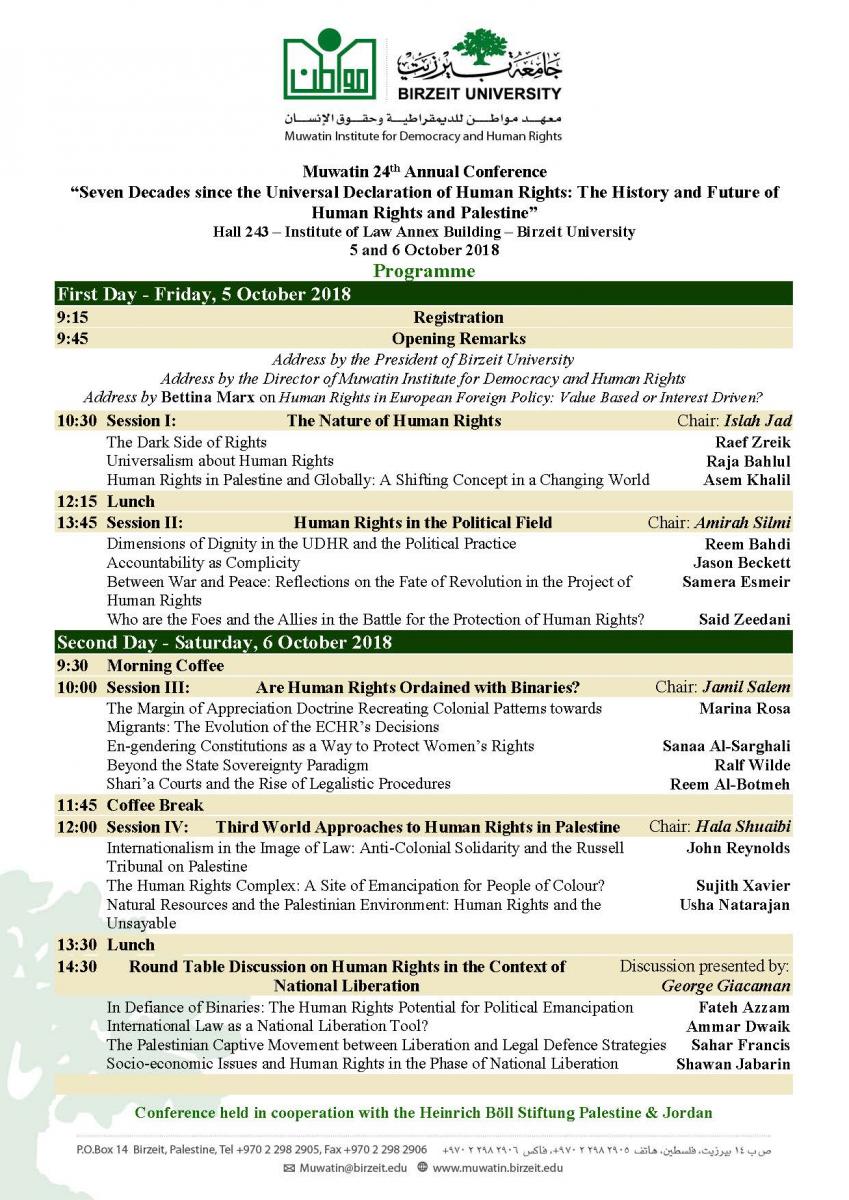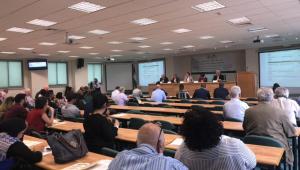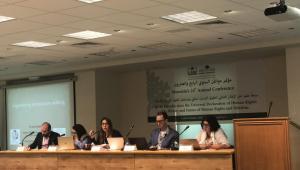Muwatin’s 24th Annual conference will tackle questions related to the fate of Human Rights after seven decades since the adoption of the Universal Declaration of Human Rights (UDHR). The conference aims to reflect on the UDHR’s implications, impact, achievements and failures, and to consider the UDHR’s future and our responsibilities towards it. Although the UDHR formed the cornerstone of a global movement to recognize human rights, protect human dignity; defend freedoms, and safeguarding human lives, it however displayed the shortcomings characteristic of international treaties drafted during the colonial era.
Despite persistent attempts to find ways to protect and promote human rights, at least during the last 3 decades, the limitations of their impact are demonstrated by the lack of progress in fighting poverty, environmental problems, wars, inequalities, and the absence of the protection human dignity and the right to life. The prevailing neoliberal system signals the decreasing chances of achieving human rights.
The conference will discuss issues related to the concept of human rights, its transformations, its applications, its role and its place in the context of the Palestinian liberation and its future. These issues will be discussed by a variety of international and local experts and academics from various backgrounds and regions, from a wide range of perspectives. The conference will leave room for the dialogue between attendants and conference speakers. The conference also features some accompanying activities including a photo exhibition about environmental pollution, an Information Kiosk for the Right to Enter movement, and a book exhibition for Muwatin publications.
The conference will take place on Friday and Saturday, 5 and 6 October 2018, in conference hall (243) at Muwatin Institute located in the Institute of Law Annex Building – Birzeit University. Simultaneous translation is available
Concept Note
On the seventieth anniversary of the Universal Declaration of Human Rights (“UDHR”), given the continuing gross violations of the UDHR at global and local levels, it is worthwhile to reflect on the UDHR’s implications, impact, achievements and failures, and to consider the UDHR’s future and our responsibilities towards it.
The United Nations’ adoption of the UDHR in 1948 represented an unprecedented milestone in the development of a set of principles that recognise equality and dignity, establish freedom and justice, and require states to ensure the conditions necessary for the full realization of those principles. The UDHR formed the cornerstone of a global movement to recognize human rights, protect human dignity, defend freedoms, and safeguarding human lives. It formed the basis of emancipatory struggles, including those related to self-determination, women, minorities, workers, prisoners of consciousness, and other oppressed people. The UDHR also played a central role in the development of vital milestones in the Global South’s quest for self-determination and independence, including The Bandung Conference (1955), the creation of The Non-Aligned Movement (1961), and the Tehran Conference on Human Rights (1968).
At the same time, the UDHR displayed the shortcomings characteristic of international treaties drafted during the colonial era. Major powers in the aftermath of WWII had a disproportionate impact on the UDHR’s drafting. Only 58 states were members of the United Nations (“UN”) when the vote to adopt the UDHR took place in the General Assembly; consequently, more than two thirds of the countries that are members of the UN today did not participate in the UDHR’s creation (not to mention non-member states, such as Palestine). Colonial era concepts such as “universal respect,” “social progress,” “nationality,” “a person before the law,” “national tribunals,” “rights granted by the constitution,” “security of person,” “periodic and genuine elections,” and “a democratic society” are used throughout the UDHR, reflecting its status as an instrument of modernization and its pedigree as an “enlightenment” project. Such concepts are not representative of the world population. Rather, they assume that all people must “live up” to the model of the nation-state and the value system accompanying it. The language of the UDHR, moreover, reflects a liberal ideology that exaggerates the role and place of the individual, reflects the balance of powers at the drafting stage, and assumes the validity of modernist structures and values for the world. As Trigo (2017) puts it, the UDHR claims “Third World countries have human rights that First World countries define.”
Third World countries, along with several liberation movements that had not formed states, had to struggle for “real universality” in the UDHR’s substance, tenor, meaning, and effect. They had to struggle to focus the UDHR’s impact on achieving liberty and completing the processes of decolonization. This struggle took place despite their formation in the postcolonial (or neo-colonial) era; their adoption and endorsement of international law systems; the enormous differences in the political and ideological standings of these countries and their movements; and their asymmetrical alignments with the two poles of the Cold War. For decades, Third World countries worked to develop the principles of the UDHR to reflect the right of peoples to self-determination and the right to resist colonialism. They also worked to associate themselves with other principles of international law such as sovereignty, formal equality states, and economic development. Their efforts occurred primarily under the umbrella of resistance and decolonization projects.
These efforts, as well as the emerging force of anti-colonial alliances that were led by the Non-Aligned Movement, have contributed to keeping the Palestinian cause a viable emancipatory project that drew worldwide diplomatic, political, and military support. This support helped establish a platform for the continuation of hope, an important factor in the steadfastness of the Palestinian people. The forces insisting on anti-colonial emancipation remain one of the most important pillars of support for the recognition and fulfilment of Palestinian rights.
With the transformations of the last decade of the twentieth century including the collapse of the Eastern Bloc, the emergence of the unipolar world, the rise of international terrorism, the decline of the Non-Aligned Movement and its countries, and the emergence of the “new world order,” it has become difficult to struggle for the “universalization of universal concepts”. Endeavours to develop rights in line with the interests of the people of the Global South were practically halted and replaced by new schemes whose pretentions included the facilitation of a “postmodern” global village.
New mechanisms have emerged to regulate the meanings, interpretations, and applications of international legal principles, including those set forth in the UDHR. Distinct from the practices of national sovereignty, these new mechanisms have become an expression of unipolar hegemony over international relations and conventions. The change in regulation is so convoluted that a range of tools, originally central to the system and indicative of it - such as the concepts of international consensus and international law - have been frequently ignored and replaced by new terms or jargon such as the “will of the international community”. Such new terminology reflects the acceptance of the transformation of the world order into a regime of “might makes right”. Chomsky (2009) and others observe that the words “international community” really mean the “United States joined by some allies and clients,” and the media that expresses them.
In the era of globalized neoliberalism, human rights have become more intensively and extensively violated, and more difficult to defend. States have left or have been forced to abdicate their traditional role of protecting their citizens and the “organization” of their lives to the private sector. This has allowed transnational corporations to take custody over peoples’ rights, partially replacing the role of states with arrangements such as “corporate social responsibility”. Despite persistent attempts to find ways to protect human rights, the limitations of these efforts are demonstrated, at least for the last 3 decades, by the lack of progress in fighting poverty, environmental problems, wars, other inequalities, and the absence of protecting human dignity and the right to live. The prevailing neoliberal system signals the decreasing chances of achieving human rights.
At the Palestinian level, the application of international law and human rights standards used to describe the process of national liberation have undergone many transformations, including the description of resistance that is legitimate under international law as “terrorism”. The right of the Palestinian people to self-determination is conditioned by the consent of the occupying power in prevailing international discourse, including at the UN. State obligations have been transformed from legal duties to charity, often reduced to aid, which is increasingly subject to conditions contrary to the will of the Palestinian people and which amounts to the abandonment of inherent and inalienable rights.
Many years of oppression, displacement, and occupation have prevented Palestinian society from normal development, caused its deformation, and produced a set of distorted priorities. As a result, social and economic rights are virtually ignored and political divisions consume energy. People living under occupation are left suffering from escalating unemployment, poverty, and deprivation. This is a people engaged in the struggle for national liberation whose forces have been exhausted in internal conflict that are characterized by corruption and fragmentation. The chances that the Palestinian people will exercise their right to self-determination, see the return of their refugees, realize human rights and freedoms, and establish a state are grimmer today than in the past.
Against this context, Muwatin will hold its 24th Annual Conference entitled “Seven Decades Since the Universal Declaration of Human Rights: The Past and Future of Human Rights and Palestine”. The Goal of the conference is to discuss the current Palestinian reality, review the system of human rights protection globally and locally, study the role of this system in national liberation, and examine the system’s potential to produce a better future for the world. Muwatin’s conference will take place on 5 and 6 October 2018 at Birzeit University.
Conference Rubrics
The conference will examine, inter alia:
- Seven decades after the UDHR: what human rights do we strive for? What are the frameworks capable of delivering these rights?
- What is the fate of the universality of human rights in an era of excessive differentiations based on identities, fragmentation of nations, and the growth of ethnic, sectarian, tribal, and right wing populism? What is the impact of such fragmentation on “cultural specificity”?
- Is it possible to develop a human rights system that includes principles, controls, and protection systems by moving outside the dilapidated system of international law?
- Is it possible to develop mechanisms that discipline global powers (such as large corporations, the G8 and G20) and ensure their commitment to human rights standards?
- How is it possible for the human rights system to adopt freedom as its compass and to become immune to being used as a colonial tool?
- Who are the allies, and the adversaries, in the battle to protect human rights?
- Between the universality of new colonialism and the globalization of poverty, where does the human rights system stand?
- Can the standards of human rights protection be maintained under the current global security agenda and the new security doctrine? Or, is the human rights system capable of addressing the shift of rights under the umbrella of security? And, is it able to counter globalized terrorism?
- Can the human rights system remain neutral and distinct from colonialism? What are its duties? What are its mechanisms for the decolonization of Palestine?
- What is the fate of regional human rights projects? Are regional human rights regimes linked to regional colonial arrangements, or can they constitute a fortress of resistance against colonialism and can they help advance an emancipatory project?
- What are the flaws and accomplishments of the human rights movement in Palestine? What are the prospects for developing the protection of human rights in Palestine, and how can its agenda be developed?



